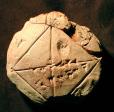
Detailed Syllabus and Schedule -updated, March 24, 2020
We will learn how mathematics developed, from c. 2000 BCE to the beginning of the 20th century. Along with the Western tradition (Mesopotamia/Egypt, Greece, Europe) we will study developments in Central/South America, in India and in China. As much as possible, we will do mathematics as it was done in the period we are studying.
Instructor. Anthony Phillips. Office: 3-119 Math Tower. email: tony "at" math.stonybrook.edu or through Blackboard.
Class meetings: Tuesday, Thursday 2:30-3:50 in Harriman 108.
Office hours: After 3/30 I will have virtual office hours. This means you can request a one-one
zoom meeting and I will set it up. As usual, continue to correspond with
me through Blackboard. Additionally, as of April 5, open zoom meeting for office
hours every Wednesday, 2-4 pm. Students have been sent instructions
for joining.
Textbooks.
Grading policy. Quizzes and Homework 30% (The 30% will be split between the 3 administered quizzes and the 5 homework assignments due April 2, 9, 16, 23, 30), Class Presentation 20%, Term Paper 50%
Readings, Quizzes, Presentations, Paper.
Writing Requirement. Successful completion of MAT 336 with a C or better satisfies DEC H and the expository portion of the upper-division writing requirement for the mathematics major, as well as the STAS, WRTD, and SPK objectives in the Stony Brook Curriculum (see below).
Learning Outcomes for "Understand relationships between Science or Technology and the Arts, Humanities or Social Sciences (STAS)"
Learning Outcomes for "Speak Effectively before an Audience (SPK)"
Learning Outcomes for "Write Effectively within One's Discipline (WRTD)"
Disability Support Services (DSS):
If you have a physical, psychological, medical or learning disability that may impact your course work, please contact Disability Support Services, ECC (Educational Communications Center) Building, room 128, (631) 632-6748. They will determine with you what accommodations, if any, are necessary and appropriate. All information and documentation is confidential.
Students who require assistance during emergency evacuation are encouraged to discuss their needs with their professors and Disability Support Services. For procedures and information go to
this website.
Academic Integrity: Each student must pursue his or her academic goals honestly and be personally accountable for all submitted work. Representing another person's work as your own is always wrong. Faculty are required to report any suspected instances of academic dishonesty to the Academic Judiciary. For more comprehensive information on academic integrity, including categories of academic dishonesty, please refer to the academic judiciary website.
Critical Incident Management: Stony Brook University expects students to respect the rights, privileges, and property of other people. Faculty are required to report to the Office of Judicial Affairs any disruptive behavior that interrupts their ability to teach, compromises the safety of the learning environment, or inhibits students' ability to learn.